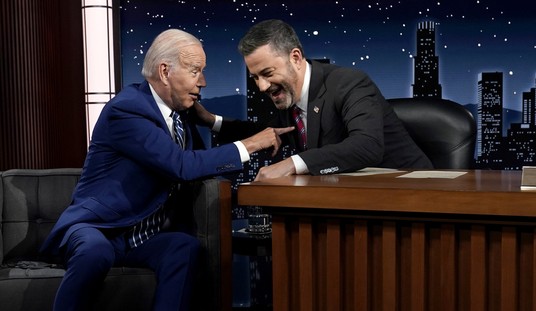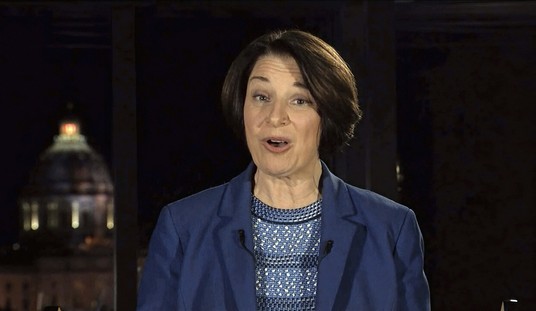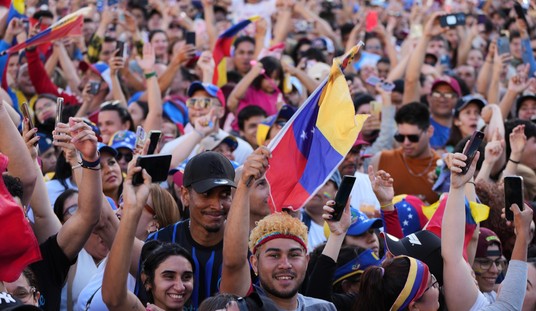So startlingly hopeful that I’m reluctant to jinx it by even touching it. Basra’s been a Shiite gangland for years but was set for total disintegration this summer as the Brits pulled out and the militias got set to turn the city into Thunderdome in a free-for-all for control of Iraq’s oil. Assuming this new report is true, though, then it’s Yon 1, Newsday 0.
Once the last remaining 500 soldiers based in Basra city at the Basra Palace had withdrawn – early last month – the level of violence began to fall. Today, the difference is tangible. British troops no longer patrol in Basra, that role is now left to the Iraqi security forces, but they still transit through the city en route to the Shatt al-Arab waterway. Yet apart from the odd small arms fire, none of the troops so far have been attacked.
With all the troops now based at the Basra air station a few miles northwest of the city, they are no longer viewed as a provocative occupying force…
The key to the change in atmosphere which led directly to Gordon Brown’s decision to cut troop numbers by half to 2,500 next spring followed a secret deal reached between a new Iraqi army commander and Shia militia leaders in Basra, senior British military officers told The Times…
The reason why the Shia militia agreed to the secret deal was that General Mohan and General Jalil had both been appointed by Baghdad. It demonstrated to the Shia power-brokers in Basra that the government was determined to play a dominant part in the politics of southern Iraq, something the leaders in Baghdad had failed to demonstrate hitherto.
It needed two strong men from out of the Basra area to bash heads together in Basra and to persuade the rival and feuding Shia militia to stop killing each other and to leave the British troops alone. So far it has worked spectacularly well, although the rocket attack on the British airbase camp outside Basra on Monday evening was evidence that not all the Shia groups are happy with the Mohan deal.
Follow the link and read at the end about how the twin fears of “Talibanization” and an Iranian takeover haven’t (yet) materialized. Two things I don’t understand, though. First, since when is the Iraqi Army such a superior fighting force that they can take on Iranian-trained militias like the Mahdi Army and Badr Brigades and “bash heads together” at will? That’s absurd on its face. Second, what incentive does SCIRI or the Sadrists have to bow before Baghdad when control of so many of Iraq’s oil fields is within their grasp by controlling Basra? Having two generals come down from the capital would seem to be the perfect occasion to teach the central government a lesson by pushing them out, not accepting their authority. Exactly what kind of quid pro quo, I wonder, did Maliki offer them to get them to play ball? I’m thinking maybe it’s an extension of Sadr’s grand strategy of lying low to help pacify the country until the United States has withdrawn in significant numbers and then making his play for power. Other than that, I can’t explain the sudden quiescence. Just like I can’t explain this.
Watch for this story tomorrow to become that rarest of Iraq dispatches — a good news piece seized on by the left with both hands. If it’s true, it’s obviously a powerful case for withdrawal from at least some parts of the country.
Update: For the second time tonight, wow. I do believe we have a trend. And from the New York Times, no less. Has Sadr finally overplayed his hand?
The sectarian landscape has shifted, with Sunni extremists largely defeated in many Shiite neighborhoods, and the war in those places has sunk into a criminality that is often blind to sect.
In interviews, 10 Shiites from four neighborhoods in eastern and western Baghdad described a pattern in which militia members, looking for new sources of income, turned on Shiites…
“We thought they were soldiers defending the Shiites,” said Sayeed Sabah, a Shiite who runs a charity in the western neighborhood of Huriya. “But now we see they are youngster-killers, no more than that. People want to get rid of them.”…
The street militia of today bears little resemblance to the Mahdi Army of 2004, when Shiites following a cleric, Moktada al-Sadr, battled American soldiers in a burst of Shiite self-assertion. Then, fighters doubled as neighborhood helpers, bringing cooking gas and other necessities to needy families.
Now, three years later, many members have left violence behind, taking jobs in local and national government, while others have plunged into crime, dealing in cars and houses taken from dead or displaced victims of both sects.
Even the demographics have changed. Now, street fighters tend to be young teenagers from errant families, in part the result of American military success. Last fall, the military began an aggressive campaign of arresting senior commanders, leaving behind a power vacuum and directionless junior members…
Ali, the Ur businessman, said he expected the Mahdi Army to be much smaller in the future. People simply do not believe its leaders anymore. “There is no ideology among them anymore,” he said.
According to the Times, at least 25 Shiite sheikhs in the city are now cooperating with U.S. troops. The boldface part, which suggests that a lot of these tools have been kicked upstairs into positions of influence, is worrisome, but who knows? Maybe bureaucracy will have a domesticating effect on them. Needless to say, all in all, the erosion of the Sadr brand is all to the good.
Update: D.J. Elliott has more on the security efforts in Basra.







Join the conversation as a VIP Member